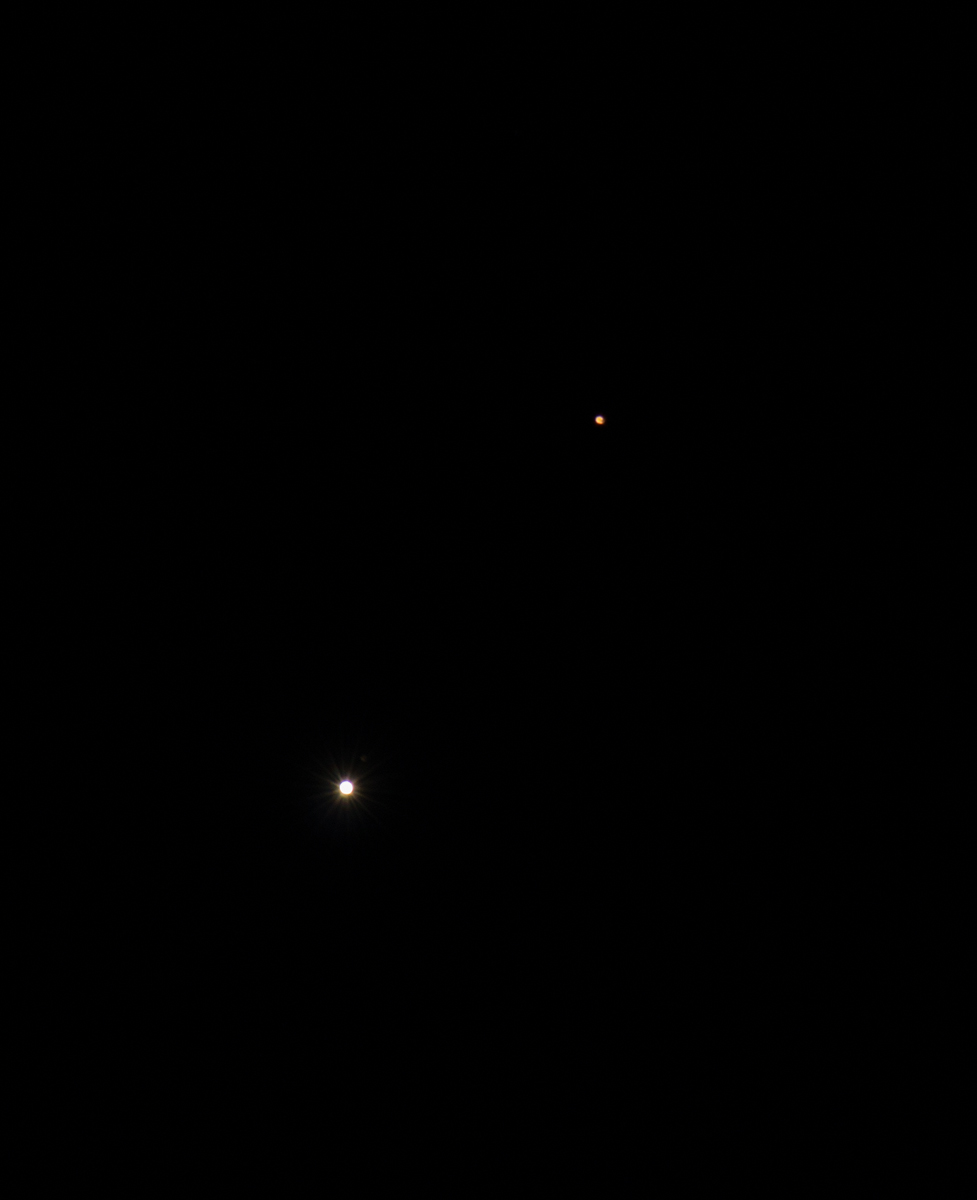It looks like you're using an Ad Blocker.
Please white-list or disable AboveTopSecret.com in your ad-blocking tool.
Thank you.
Some features of ATS will be disabled while you continue to use an ad-blocker.
share:
originally posted by: smurfy
originally posted by: funbox
a reply to: flice
Venus, Sirius, Rigel ? all good contenders , mars too if you have high brightness eye-site settings
funbox
I'd say Venus this time, it is very bright and closer to home, and you can see more of a pulse like effect, though it is more noticeable lately... and not so much scintillating like far away stars, Sirius is the king of scintillation though.
Venus orbits closer to the Sun than us so rises/sets around the same time as the Sun so would not be visible at 9.40pm.
edit on 5-3-2015 by
wmd_2008 because: (no reason given)
originally posted by: Britguy
I managed a quick shot from my balcony a couple of weeks back. Noticed that there was another light point just above and to the right of Venus, Had a look through the spotting scope and it was Mars.
I really want to do some nighttime and astro photography. A project for this year I think.
This is the thread for you if you haven't already seen it.
Members Astrophotography
originally posted by: AshOnMyTomatoes
a reply to: Asynchrony
Either of them will be sparkly, considering it's not the planet that is sparkling but the atmosphere. It mainly depends on how low in the sky they are. The closer to the horizon, the more air is between you and the planet you're looking at, so the more distortion and sparkly motion.
A couple years ago, I saw a particularly sparkly Jupiter, because it was close to Earth, very bright, and near the horizon.
I didn't know you could see Jupiter. I'll need to research this more.
originally posted by: Asynchrony
originally posted by: AshOnMyTomatoes
a reply to: Asynchrony
Either of them will be sparkly, considering it's not the planet that is sparkling but the atmosphere. It mainly depends on how low in the sky they are. The closer to the horizon, the more air is between you and the planet you're looking at, so the more distortion and sparkly motion.
A couple years ago, I saw a particularly sparkly Jupiter, because it was close to Earth, very bright, and near the horizon.
I didn't know you could see Jupiter. I'll need to research this more.
Jupiter is one of the brightest night sky objects, and a good pair of binoculars will show you the Galilean moons.
a reply to: Britguy
I saw that too and downloaded SkEye to identify them - Venus and Mars. It turned out that it was the closest conjunction since '08. They stood out above the Liverpool skyline and out-shone the city's light pollution.
Sights like that remind me that we're a spinning, planetary part of a wheeling solar system. It's good to know someone else was admiring it too. : )
I managed a quick shot from my balcony a couple of weeks back. Noticed that there was another light point just above and to the right of Venus, Had a look through the spotting scope and it was Mars.
I saw that too and downloaded SkEye to identify them - Venus and Mars. It turned out that it was the closest conjunction since '08. They stood out above the Liverpool skyline and out-shone the city's light pollution.
Sights like that remind me that we're a spinning, planetary part of a wheeling solar system. It's good to know someone else was admiring it too. : )
originally posted by: Kandinsky
a reply to: Britguy
I managed a quick shot from my balcony a couple of weeks back. Noticed that there was another light point just above and to the right of Venus, Had a look through the spotting scope and it was Mars.
I saw that too and downloaded SkEye to identify them - Venus and Mars. It turned out that it was the closest conjunction since '08. They stood out above the Liverpool skyline and out-shone the city's light pollution.
Sights like that remind me that we're a spinning, planetary part of a wheeling solar system. It's good to know someone else was admiring it too. : )
And not only that... the entire solarsystem is darting away at the same time, while spinning around.
Something I didn't quite understand or "realize" till recently.
School always gave the perception that the sun was more or less a stationary object in space and we are going around it. But we are all moving.
edit on 7/3/15 by flice because: (no reason given)
new topics
-
Putin, Russia and the Great Architects of the Universe
ATS Skunk Works: 2 hours ago -
A Warning to America: 25 Ways the US is Being Destroyed
New World Order: 6 hours ago
top topics
-
President BIDEN's FBI Raided Donald Trump's Florida Home for OBAMA-NORTH KOREA Documents.
Political Conspiracies: 12 hours ago, 29 flags -
A Warning to America: 25 Ways the US is Being Destroyed
New World Order: 6 hours ago, 12 flags -
Las Vegas UFO Spotting Teen Traumatized by Demon Creature in Backyard
Aliens and UFOs: 17 hours ago, 7 flags -
Is AI Better Than the Hollywood Elite?
Movies: 14 hours ago, 3 flags -
Maestro Benedetto
Literature: 14 hours ago, 1 flags -
Putin, Russia and the Great Architects of the Universe
ATS Skunk Works: 2 hours ago, 1 flags

